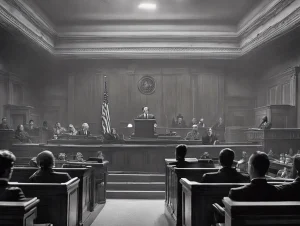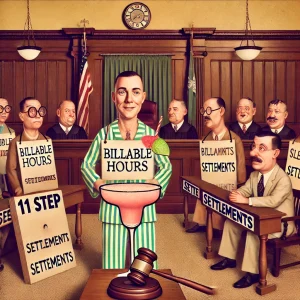© 2024 Mark Cohen, J.D., LL.M
“Dude, you look high. You been smokin’?”
“No, man, I just watched this YouTube video that blew my mind.”
“What was it about, man?”
“Man, it was about the free market theory.”
“Yeah, like, far out. What is the free market theory?”
“Well, like, a long time ago, maybe a thousand years ago, this dude from Scotland named Adam Smith wrote a book about economics –”
“Ebonics, man. I’ve heard of that.”
“No, man, “not Ebonics. Economics, you know, money.”
“Oh yeah, man. Economics.”
“Anyway, this dude said the best way for nations to prosper would be for governments not to regulate the economy.”
“Like, to just let the corporations do whatever they want?”
“No, man, there were no corporations back then, just farmers, merchants, and artisans.”
“Yeah, but if there was no government, who would make the laws and stuff?”
“That’s just it, man. The dude said that because everyone is selfish, their selfish actions will all cancel each other out and automatically allocate resources efficiently.”
“So, this guy from Scotland said it’s good to be selfish?”
“Yeah, but only everyone is selfish, you know, so all the selfishness balances out.”
“Okay, man, give me an example.”
“Sure, man. Imagine you’re a wheat farmer in a county with one thousand wheat farmers. And all the other farmers are selling their wheat for five cents a bushel, and raise your price to six cents a bushel.”
“Yeah, man, wheat is important, so I want my six cents.”
“Well, this dude Smith said your selfishness won’t work because there will be 999 other selfish farmers in the county that will sell their wheat for five cents a bushel. So, any dude looking to buy wheat will stop buying from you and you’ll have to drop your price back to five cents a bushel.”
“Oh yeah, man. I see.”
“The dude said it’s like an invisible hand that makes everything work out fairly.”
“An invisible hand? Man, that is far out.” (Laughing hysterically).
“Yeah, he said governments don’t need to regulate business because the invisible hand will make sure everything is cool for everyone. Like Shambala.”
“Wait a minute, man, what if all those farmers got together and agreed to raise their price to six cents a bushel?”
“That would violate the Sherman Antitrust Act, man.”
“But that’s a law, man. I thought you said the invisible hand would just make it all work out.”
“Well, you know, there’s some flaws in the theory. Like, the theory is based on a lot of assumptions that probably aren’t true now.”
“Well, you know what happens when you assume something?”
“No, I forget, man. But anyhow, this dude was clear that the invisible hand only works under certain conditions. And one of those was that no seller or producer of a good had a big enough market share to influence price or supply.”
“I see, man. So, if you have one thousand farmers, none of them really grows enough wheat to impact the price or supply of wheat.”
“Exactly, man.”
“Yeah, but that seemed like a better theory a thousand years ago, man. I mean, today, if I want to buy an operating system, I must choose between Microsoft and Apple. There’s not a lot of competition driving the price down. And I don’t have enough money to just start my own operating system company.”
“Yeah, man, it’s sad. That’s why the invisible hand doesn’t do its thing that much anymore. The assumptions are no longer true.”
“That’s a bummer, man. Because I could dig an invisible hand. You know, always looking around trying to see it. Make friends with it. Watch TV with it.”
“You can’t see it, man. It’s invisible.”
“Oh yeah. Well, let’s go get some tacos, man.”
“Taco Bell or Taco Johns?”
“Either way, man. The cost is the same.”





